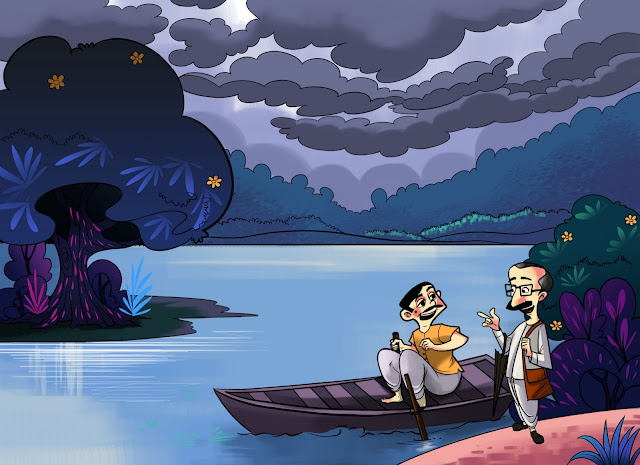To earn his living a Sufi fakir used to work as a ferryman on a river. One day a village pundit wanted to go across the river. The fakir offered to take him across free of charge. He used to charge one or two paisa for the journey. The pundit sat down in the boat and the fakir started rowing. They were the only people in the boat.
The pundit asked him, "Can you read and write?" What else can a pundit ask? He wants to teach others whatever he knows himself. We can give to others only what we have. Pundits are obsessed with their so-called knowledge. He could not see the radiance of the fakir, he took him to be an ordinary boatman. But the fakir was an extraordinary man.
The pundit did not know that the godliness about which he had been contemplating, hearing and discussing was present in this extraordinary man. It was peeping through him. If he had eyes to see he could have found in the fakir all that he had dreamed about and read about in the scriptures. Something was present there.
But all that the pundit could ask was, "Do you know reading and writing?"
Well, if a pundit even meets God he is sure to ask, "Where is your certificate? What is your education?" A pundit has his own world, he lives in his own world of words and scriptures.
But all that the pundit could ask was, "Do you know reading and writing?"
Well, if a pundit even meets God he is sure to ask, "Where is your certificate? What is your education?" A pundit has his own world, he lives in his own world of words and scriptures.
The fakir replied, "No, I do not know reading and writing. I am absolutely illiterate and rustic." If there was an iota of awareness in the pundit he would have seen the utter humility of the fakir.
To accept one's own ignorance is the first step towards self-knowledge. If one accepts one's ignorance wholeheartedly then it can become the last step also. When you are acutely aware of not knowing anything then your ego is bound to disappear, its very foundation will give way. The building of the ego will fall down and you will slip into egolessness. That is the door from where one can be in contact with the divine.
To accept one's own ignorance is the first step towards self-knowledge. If one accepts one's ignorance wholeheartedly then it can become the last step also. When you are acutely aware of not knowing anything then your ego is bound to disappear, its very foundation will give way. The building of the ego will fall down and you will slip into egolessness. That is the door from where one can be in contact with the divine.
The fakir said, "I don't know anything. I am absolutely illiterate."
On hearing this the pundit remarked, "Then one-fourth of your life is wasted."
The boat sailed a little farther. The pundit asked again, "But you must know arithmetic at least? It is necessary for maintaining accounts."
On hearing this the pundit remarked, "Then one-fourth of your life is wasted."
The boat sailed a little farther. The pundit asked again, "But you must know arithmetic at least? It is necessary for maintaining accounts."
The fakir said, "I do not possess anything so there is no need to maintain any accounts. Whatever I earn during the day, I spend by the evening. I do not earn more than the need of my daily bread. By the night I am a fakir again. Then in the morning I start earning again. Existence has been providing for me enough until now so why should I worry about tomorrow? If somebody gives me money, it is all right. If somebody does not give me anything, even then it is all right. I have lived up to now and will be able to live in the future also. Neither the giver gives anything which lasts forever nor the one who does not give takes away something which may be a loss forever - it is all just a play."
On hearing this the pundit said, "Well, half of your life is wasted." Just at that time a storm started, the boat began to toss over the waves and it seemed that it may sink any moment.
The fakir laughed because the pundit got very frightened. Who will not when death is imminent? The pundit used to talk of deathlessness, used to say that the soul is immortal, but these scholarly claims of the soul, of deathlessness, are of no use when faced by death.
The fakir laughed because the pundit got very frightened. Who will not when death is imminent? The pundit used to talk of deathlessness, used to say that the soul is immortal, but these scholarly claims of the soul, of deathlessness, are of no use when faced by death.
The fakir asked him, "Do you know how to swim?"
The pundit answered, "No, not at all."
The fakir said, "Then the whole of your life is wasted! I am going to jump because this boat will sink."
OH IDIOT! SING THE SONG OF THE DIVINE, SING THE SONG OF THE DIVINE, BECAUSE AT THE TIME OF DEATH THE MEMORIZATION OF GRAMMAR WILL NOT SAVE YOU.
~ OSHO ,Excerpt from - "The Great Transcendence"
The pundit answered, "No, not at all."
The fakir said, "Then the whole of your life is wasted! I am going to jump because this boat will sink."
OH IDIOT! SING THE SONG OF THE DIVINE, SING THE SONG OF THE DIVINE, BECAUSE AT THE TIME OF DEATH THE MEMORIZATION OF GRAMMAR WILL NOT SAVE YOU.
~ OSHO ,Excerpt from - "The Great Transcendence"


Comments
Post a Comment